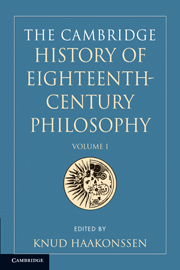Book contents
- Frontmatter
- CONTENTS
- Preface
- Methods of reference and abbreviations
- List of contributors
- I The Concept of Eighteenth-Century Philosophy
- II The Science of Human Nature
- 7 Philosophical Methods
- 8 Human Nature
- 9 Perception and Ideas, Judgement
- 10 Self-Consciousness and Personal Identity
- 11 Reason
- 12 Substances and Modes, Space and Time
- 13 Causality
- 14 Knowledge and Belief
- 15 Scepticism
- 16 Philosophy of Language
- 17 Rhetoric
- 18 Aesthetics
- 19 The Active Powers
- 20 Education
- Biobibliographical Appendix
- Bibliography
- References
13 - Causality
from II - The Science of Human Nature
Published online by Cambridge University Press: 28 March 2008
- Frontmatter
- CONTENTS
- Preface
- Methods of reference and abbreviations
- List of contributors
- I The Concept of Eighteenth-Century Philosophy
- II The Science of Human Nature
- 7 Philosophical Methods
- 8 Human Nature
- 9 Perception and Ideas, Judgement
- 10 Self-Consciousness and Personal Identity
- 11 Reason
- 12 Substances and Modes, Space and Time
- 13 Causality
- 14 Knowledge and Belief
- 15 Scepticism
- 16 Philosophy of Language
- 17 Rhetoric
- 18 Aesthetics
- 19 The Active Powers
- 20 Education
- Biobibliographical Appendix
- Bibliography
- References
Summary
The question of the nature and status of causality is basic both for ontology and epistemology. Thus Aristotle emphasised that it is only possible to know (in the full sense of the word) an object if its first cause is known. For Hume, causality is an essential ingredient of ‘the cement of the universe’. Obviously, the meaning of causality depends on a series of ontological, metaphysical, and epistemological presuppositions. Insofar as seventeenth- and early eighteenth-century metaphysics is decisively oriented towards the concept of substance, the assessment of the causal power of substances and their interaction will depend on how these substances are determined. Instead, if the ontological concept of a substance is given up, then the problem of understanding ideas and objects as causes or effects arises in quite another way. Not until Locke’s critical turn in epistemology was the question of the scope and limits of human knowledge insisted upon, which naturally involved a new understanding of causality. The new theoretical physics and the emerging experimental sciences made it necessary to test causality by empirical standards. Interactions between objects and between intentions and aims of persons were now less frequently demonstrated by rational definitions and more often formulated and confirmed or denied by observation and experience.
It is one of the achievements of eighteenth-century philosophy to have distinguished between general and special laws of causality. Whereas the general law of causality says that without any exception all objects or events are causally connected, the special law of causality states that specific objects of the same class are connected causally with one another.
- Type
- Chapter
- Information
- The Cambridge History of Eighteenth-Century Philosophy , pp. 368 - 388Publisher: Cambridge University PressPrint publication year: 2006
References
- 1
- Cited by



